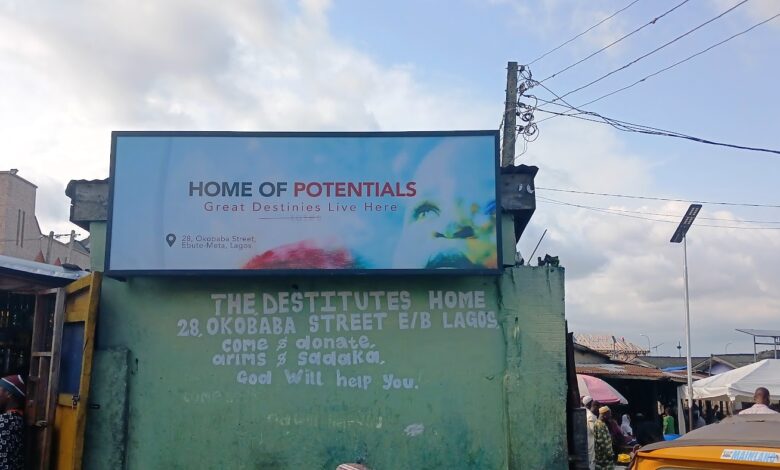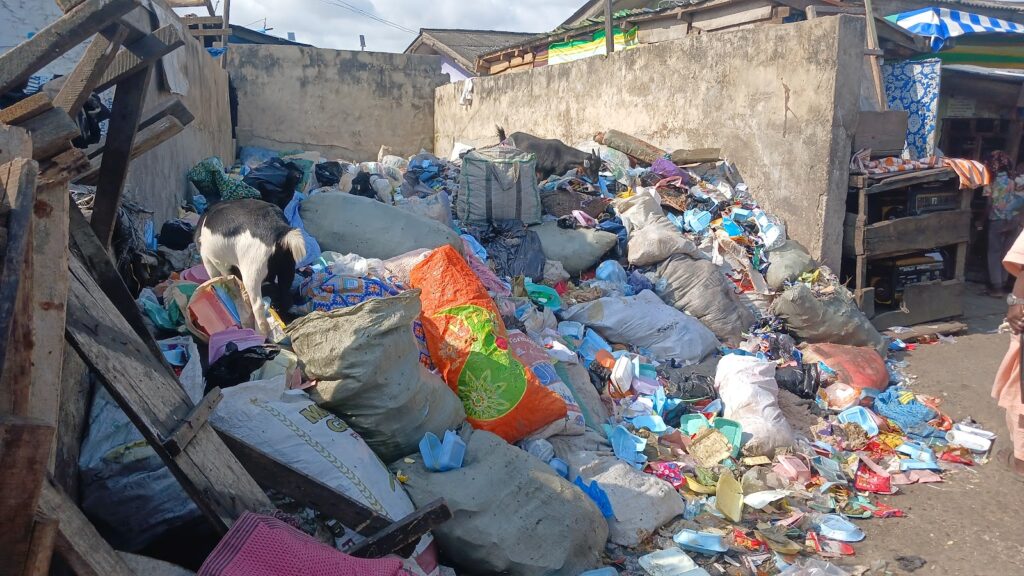In Lagos Destitutes Home, Persons With Disability Live In Disease-Infested Conditions
The Okobaba home for PwDs lacks basic amenities, including potable water, a development that exposes its residents to typhoid and skin diseases such as fungal infections.

Until he became a leper in the late ‘80s, Mohammed Baba never visualised himself living in an environment reserved for persons with disability (PwD). Before then, he worked as a civil servant in Borno State, northeastern Nigeria.
One morning, as he prepared for work, he observed red skin patches on his hand but dismissed it as mere rashes. The next day, however, he began to experience ulcers and swelling – symptoms of leprosy. After sharing his experience with friends and relatives, he was advised to try random herbal medications as remedies, but nothing worked.
“By the time I got to the hospital, I was told it’s leprosy,” Baba said. Currently, he is the secretary of the Integrated Dignity Economic Advancement (IDEA), a group that advocates and promotes human rights and the welfare of people challenged by leprosy in Nigeria.
Also called Hansen’s disease, leprosy is a bacterial infection which spreads through the body slowly. If left untreated, it leads to damage of hands, feet, and eyes. Though curable with a combination of antibiotics used in an approach known as multidrug therapy, it can easily be contracted through long-term contact with someone battling with the disease, so carriers are often excluded from their immediate communities.
“Despite going to the hospital regularly and taking drugs to cure the disease, people began to discriminate against me. When I realised that things were getting worse, I visited prayer grounds and met with several spiritual leaders, yet nothing changed,” Baba told HumAngle during a visit to the Destitutes Home in Lagos, South West Nigeria. “As the discrimination became unbearable, I had to resign in the early ‘90s, believing that the downfall of a man is not the end of his life.”

His wife and two children would later bear the brunt of his disability as survival became a struggle. So, he left Borno for Lagos, leaving his family in the care of his extended relatives. Baba would later end up at the Destitutes home located at Okobaba area of Ebute-Metta, Lagos. The facility was constructed by Mohammed Buba Marwa, an ex-military administrator of Lagos, to provide shelter for the needy, particularly those living with physical disabilities.
For a first-timer, only a few things appear normal, as over 2000 inhabitants residing at the ‘beggars camp’, according to Baba, suffer amid deplorable conditions and stigmatisation. The three blocks of buildings serve as homes for the lepers, the blind, and the crippled.
Despite a heap of refuse, stinking toilets, and overflowing septic tanks that characterised the compound with an unpleasant smell oozing out, many residents were seen eating donated foods. Many a time, they share their meals with flies from floating human faeces in their gutters.
Speaking on the state of the Destitutes home, Baba said they survive on salt water due to the low-lying nature of Ebute-Metta. The water flows through their community from the third mainland bridge, which is the bridge connecting the commercial district of Lagos Island to the mainland. The development, according to health experts, exposes them to typhoid infections and skin diseases such as fungal infections.


According to the World Health Organisation (WHO), an unhygienic environment –like the Okobaba Destitutes home– causes transmission of diarrhoea diseases such as cholera and dysentery, as well as typhoid, intestinal worm infections and polio. Even when HumAngle informed the occupants of the chances of contracting the infections, they explained that they had become accustomed to the dirty environment as a normal part of life. While the buildings could collapse anytime, more people continue to join their colleagues in overcrowded rooms.
A pathetic life
According to Baba, an average of six people sleep in a room with little or no ventilation. Those who do not have access to rooms also build shanties with wood and zinc in the compound. They are, however, forced to sleep in the cold when the shanties collapse during heavy rainfall.
Considering the challenges at the Home, Baba is interested in going back to Borno, but he feels depressed each time he sees people running away from him despite efforts to educate them that leprosy is a curable disease. “I feel depressed anytime I see the suffering our people are subjected to. I wasn’t born like this, and I know that the downfall of a man is not the end of his life. I am very hopeful that I will still be fine because if there is life, there is hope.”
Like many other people who were not born with deformities, Yusuf Abdullahi spent the first 20 years of his life rearing cattle in Bauchi State. But after returning from the farm one evening, he discovered that he had a swollen leg. He got to the hospital, was admitted for weeks but things became worse day by day.

After years of battling discrimination and hunger in his state, he also relocated to Lagos. He has since resorted to begging for money. Abdullahi said he has witnessed several painful experiences, seeing how people rub money on their bodies and saying some curse words before spraying beggars. “There are times people curse the money they give to beggars, saying all the problems of their lives should go to us, but because I have nothing to eat and drugs at the hospital are not free, it is either I take the money, or I die,” he lamented.
Abdullahi is also concerned about the poor state of the toilets and bathrooms in the destitutes home. According to him, he hardly takes his bath due to the nature of the bathrooms. “Since I cannot walk and my wheelchair cannot enter the bathroom, I find it difficult to take my bath daily. Even when I do, I usually crawl in the dirty floors of the bathrooms with maggots and flies forcing their ways into my body most times.”

Corroborating Abdullahi’s account, Sadisu Ayuba, leader of the disabled residents at Okobaba, added that the overflowing septic tanks and unpacked waste left unattended to at the beggars’ colony pollute foods donated to them by non-governmental organisations and individuals who visit on a daily basis.
On his part, Abubakar Usman, who represents the visually impaired, said the only help they get from the state government is the supply of a few bags of rice and beans that hardly takes care of them every quarter. They even use some of the money they get from arms begging to renovate their home.
“It is so unfortunate that despite not getting enough from the money they beg across streets, the government fails to uplift the standard of living of the special people. We hear of the millions of naira the people in power use to renovate government houses and their secretariats annually yet people with disabilities are abandoned in squalor,” said Quadri Adesola, director of Caroline Initiative, a non-governmental organisation that supports people with disabilities in Lagos.

Though HumAngle contacted the Lagos State Office for Disabilities Affairs (LASODA) and the National Tuberculosis, Leprosy and Buruli Ulcer Control Programme (NTBLCP), the agencies did not respond to enquiries on efforts in place to address the challenges of the destitutes.
Despite all the negatives that characterise the camp, Damilare Onabanjo, a youth in the community, runs a development learning centre where children of the disabled are taught English-speaking skills and elementary arithmetic.
“Without understanding simple sentences, it would be difficult for them to cope in future. I believe that if they are properly brought up, they can fight for the rights of their parents in future. My dream is to help them [the destitutes] to train their children so they won’t end up like their parents. Some NGOs that are proud of what I do usually support me with the tools needed for the development of the children. I feel if they are able to read and write, things would be easier for them in future,” he said.

For Usman, he’s happy to have his two children among those taught the basics of writing and speaking, and he looks forward to a fresh start when they grow up.
“I know my children won’t end up like me. They will grow to become a lawyer and a doctor so that they can take me away from this stinking home,” he said.
Support Our Journalism
There are millions of ordinary people affected by conflict in Africa whose stories are missing in the mainstream media. HumAngle is determined to tell those challenging and under-reported stories, hoping that the people impacted by these conflicts will find the safety and security they deserve.
To ensure that we continue to provide public service coverage, we have a small favour to ask you. We want you to be part of our journalistic endeavour by contributing a token to us.
Your donation will further promote a robust, free, and independent media.
Donate HereStay Closer To The Stories That Matter




